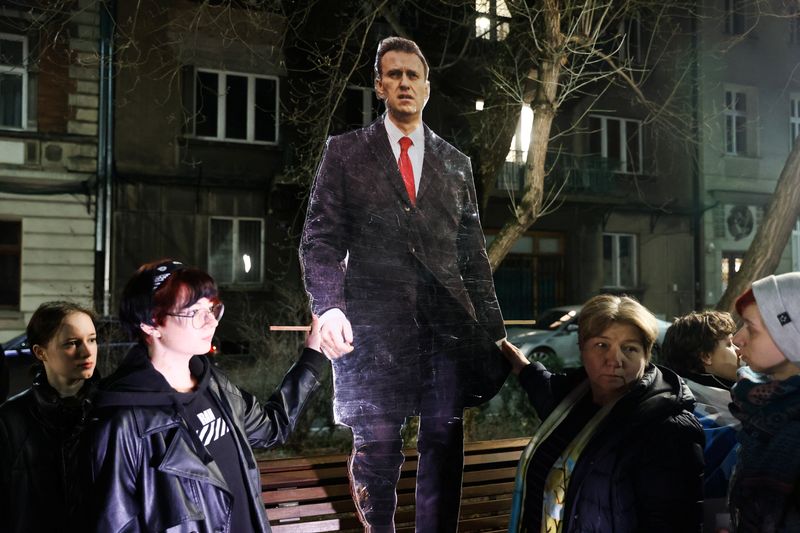
©Reuters. People gather outside the Russian consulate, following the death of Russian opposition leader Alexei Navalny, in Krakow, Poland, February 16, 2024. Jakub Porzycki/Agencja Wyborcza.pl via REUTERS
2/2
By Guy Faulconbridge
MOSCOW (Reuters) – Hundreds of flowers and candles placed in Moscow on Friday to honor the memory of Alexei Navalny, Russia’s most prominent opposition leader, were taken away overnight in black bags.
The Russian prison service said Navalny, 47, lost consciousness and died on Friday after a walk in the Arctic penal colony “Polar Wolf”.
Several dozen roses and carnations remained Saturday under softening snow at the monument to the victims of Soviet repression, which stands in the shadow of the former KGB headquarters on Lubyanka Square in central Moscow.
Vladimir Nikitin, 36, was alone placing a carnation on the Solovetsky Stone, which comes from the White Sea islands of the same name where one of the first “Gulag” forced labor camps was established in 1923 by the Bolsheviks.
The policemen watched.
Questioned by Reuters for an interview, Nikitin asked to speak in the underpass that runs under Lubyanka Square, citing fear of being arrested.
“Navalny’s death is terrible: hopes have been destroyed,” Nikitin said.
“Navalny was a very serious man, a courageous man and now he is no longer with us. He told the truth – and that was very dangerous because some people didn’t like the truth.”
At the “Wall of Sorrow” memorial on the avenue named after Soviet physicist and dissident Andrei Sakharov, some Russians laid flowers next to images of Navalny. One message read: “We will not forget, nor will we forgive.”
“I came because I have a pain,” said Arkady, who declined to give his middle name. “He was a man I respected. I hoped he was someone who could do something in the future.”
The West, including US President Joe Biden, blamed President Vladimir Putin for the death. Western leaders cited no evidence.
Kremlin spokesman Dmitry Peskov said Western leaders’ reaction to the death was unacceptable and “absolutely angry.”
Russian authorities considered Navalny and his supporters to be extremists with ties to the CIA intelligence agency who are trying to destabilize Russia. They outlawed his movement, forcing many of his followers to flee abroad.
The death of Navalny, a former lawyer, deprives Russia’s disparate opposition of its most charismatic and courageous leader as Putin prepares for an election that will keep the former KGB spy in power until at least 2030.
DEATH IN PRISON
Protest monitoring group OVD-Info said more than 110 people had been arrested across Russia at meetings and memorials to Navalny, including 64 in Russia’s former imperial capital, St. Petersburg.
Navalny rose to prominence more than a decade ago by documenting and mocking what he said was the vast corruption and opulence of the “crooks and thieves” who run Putin’s Russia.
At the time of his death he was serving prison sentences totaling more than 30 years on a series of extremism and fraud charges, which he denied and said were politically motivated.
His mother, Lyudmila, was traveling to the IK-3 penal colony in the Yamal-Nenets region, about 1,900 km (1,200 miles) northeast of Moscow, where he died, Russian media reported.
Navalny’s supporters, even in the West, see him as a Russian version of South Africa’s Nelson Mandela, who would one day walk free to lead the country. His spokeswoman, Kira Yarmysh, said there was “almost no hope” that he was alive.
His wife, Yulia, told the Munich Security Conference that Putin was responsible for her husband’s death and that the world should unite to defeat the “horrible regime” in Moscow and reclaim Russia.
Some Russians, however, dismissed that view as a classic case of wishful thinking, and pointed to an opinion poll that showed that most Russians disapproved of him and that Putin was far more popular.
“Navalny’s death is very beneficial for Putin’s opponents,” said Sergei Markov, a former Kremlin adviser.
“They will use it to undermine the legitimacy of the presidential elections in Russia, they will use it to not recognize Putin as the legitimate president. They are trying to present Putin not as the president of a hostile country, but as a criminal with whom no one should have to deal. “
News of Navalny’s death came hours before Ukraine withdrew from the southern town of Avdiivka, paving the way for Russia’s biggest advance into the country since May 2023.
THE WEST “NOT OUR FRIEND”
At “Patriki,” or Patriarch’s Ponds, the center of Moscow’s nightlife, many young Russians partied Friday night just hours after news of Navalny’s death broke. There was no sign of sadness.
“It’s obviously sad when someone dies,” Olga Kazakova, a Russian, told Reuters in central Moscow on Saturday.
“But you in the West paint him as someone he was not. The West is not our friend: you are fighting against us in Ukraine.”
Even on the bridge next to the Kremlin, where opposition leader Boris Nemtsov was killed on February 27, 2015, flowers were removed overnight. An improvised vase of white and red carnations with a small printed piece of paper remained.
“Boris Nemcov was shot in the back and killed here,” the note read.
The police watched the children make their way through the piled snow in the shadow of St. Basil’s Cathedral.